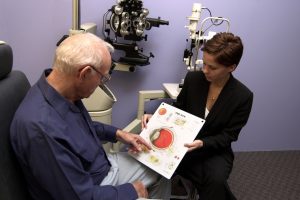
The retinal pigment epithelium is a layer of cells at the back of the eye performing an array of functions that are crucial for health vision. This is where macular degeneration starts, as immune proteins that are supposed to kill disease-causing organisms, fail to do their job properly.
Researcher Aparna Lakkaraju said, “These studies raise the possibility of treatments that could slow or prevent macular degeneration. The light-detecting cells in the retina are totally dependent on the RPE [retinal pigment epithelium] for survival, but the RPE cells are not replaced through the lifespan.”
The researchers are hopeful to develop a drug to specifically target these abnormalities in immune proteins and this way restore the protective mechanisms in the retinal pigment epithelium, preventing vision loss brought on by macular degeneration.
Tests on mice have already proven the success of macular degeneration drugs available on the market in preventing damage to the cells in the eyes.
How does macular degeneration affect vision?
Age-related macular degeneration (AMD) is a condition that progresses with age. It begins to affect people over the age of 40 by hindering sharp and central vision. Central vision is used for activities such as reading and driving. With deteriorating central vision, completing daily tasks becomes quite difficult.
AMD affects the macula, the central part of the retina that allows us to see the fine details. AMD can come in two forms: wet and dry.
Causes of age-related macular degeneration depend on its type. In wet AMD, abnormal blood vessels behind the retina grow under the macula, leading to blood and fluid leakage. This form of AMD is often characterized by rapid central vision loss.
In dry AMD, on the other hand, the macula becomes thinner with aging. Roughly 70 to 90 percent of AMD cases are in the dry form. Unlike wet AMD, dry AMD progresses slowly, affecting either one eye or both eyes.
The biggest risk factor for age-related macular degeneration is aging. People can start noticing changes to their central vision as early as the age of 40. Other uncontrollable risk factors for AMD include race – Caucasians are more likely to develop AMD – and family history.
The use of corrective lenses, either glasses or contacts, can help improve your central vision. Annual checkups with an ophthalmologist are important for monitoring the progress of AMD. Regular visits to the optometrists are key for early detection of the AMD onset.
Just like an unhealthy diet can increase one’s risk of developing age-related macular degeneration, eating a healthy diet can improve the condition. Ensure you’re enjoying a variety of fruits and vegetables, which are nutrient powerhouses.
Eye exercises may help maintain vision. Healthy lifestyle habits can also help you support your vision health. Not smoking, controlling blood pressure and cholesterol, and wearing protective eyewear – sunglasses, safety goggles – can all contribute to healthier vision and slow down progression of age-related macular degeneration.